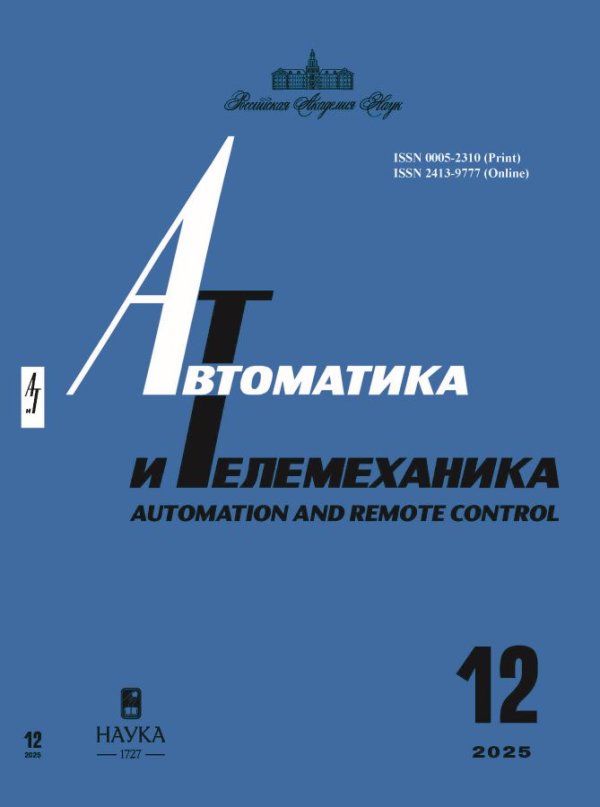Exponentially Stable Adaptive Control. Part II. Switched Systems
- Authors: Glushchenko A.I1, Lastochkin K.A1
-
Affiliations:
- Trapeznikov Institute of Control Sciences, Russian Academy of Sciences
- Issue: No 3 (2023)
- Pages: 65-105
- Section: Robust, Adaptive and Network Control
- URL: https://journals.rcsi.science/0005-2310/article/view/144265
- DOI: https://doi.org/10.31857/S0005231023030042
- EDN: https://elibrary.ru/ZYTLKX
- ID: 144265
Cite item
Full Text
Abstract
An adaptive state-feedback control system for a class of linear systems with piecewise-constant unknown parameters is proposed. The solution ensures a global exponential stability of a closed-loop system under condition that a regressor is finitely exciting after each parameters switch, and does not require neither any knowledge of a plant input matrix, nor the switching time instants. The obtained theoretical results are corroborated by numerical simulations.
About the authors
A. I Glushchenko
Trapeznikov Institute of Control Sciences, Russian Academy of Sciences
Email: aiglush@ipu.ru
Moscow, Russia
K. A Lastochkin
Trapeznikov Institute of Control Sciences, Russian Academy of Sciences
Author for correspondence.
Email: lastconst@yandex.ru
Moscow, Russia
References
- Ioannou P., Sun J. Robust Adaptive Control. N.Y.: Dover, 2013.
- Narendra K.S., Annaswamy A.M. Stable Adaptive Systems. Courier Corporation, 2012.
- Tao G. Adaptive Control Design and Analysis. John Wiley & Sons, 2003.
- Narendra K.S. Hierarchical Adaptive Control of Rapidly Time-Varying Systems Using Multiple Models // Control Complex Syst. Butterworth-Heinemann, 2016. P. 33-66.
- Chowdhary G.V., Johnson E.N. Theory and Flight-Test Validation of A Concurrent-Learning Adaptive Controller // J. Guid. Control & Dyn. 2011. Vol. 34. No. 2. P. 592-607.
- Pan Y., Aranovskiy S., Bobtsov A., Yu H. Efficient Learning from Adaptive Control under Sufficient Excitation // Int. J. Robust & Nonlinear Control. 2019. Vol. 29. No. 10. P. 3111-3124.
- Lee H.I., Shin H.S., Tsourdos A. Concurrent Learning Adaptive Control with Directional Forgetting // IEEE Trans. Automat. Control. 2019. Vol. 64. No. 12. P. 5164-5170.
- Jenkins B.M., Annaswamy A.M., Lavretsky E., Gibson T.E. Convergence Properties of Adaptive Systems and The Definition of Exponential Stability // SIAM J. Control & Optimiz. 2018. Vol. 56. No. 4. P. 2463-2484.
- Ortega R., Nikiforov V., Gerasimov D. On Modified Parameter Estimators for Identification and Adaptive Control. A Unified Framework and Some New Schemes // Annual Reviews in Control. 2020. Vol. 50. P. 278-293.
- Glushchenko A., Petrov V., Lastochkin K. Regression Filtration with Resetting to Provide Exponential Convergence of MRAC for Plants with Jump Change of Unknown Parameters // IEEE Trans. Automat. Control. 2022. P. 1-8. Early Access.
- Kersting S. Adaptive Identifcation and Control of Uncertain Systems with Switching. PhD thesis, Technische Universitat Munchen; 2018. https://mediatum.ub.tum.de/doc/1377055/1377055.pdf. Accessed March 15, 2022.
- Sang Q., Tao G. Adaptive Control of Piecewise Linear Systems: The State Tracking Case // IEEE Trans. on Automat. Control. 2011. Vol. 57. No. 2. P. 522-528.
- Sang Q., Tao G. Adaptive Control of Piecewise Linear Systems With Applications to NASA GTM // Proc. Amer. Control Conf. 2011. P. 1157-1162.
- Sang Q., Tao G. Adaptive Control of Piecewise Linear Systems with Output Feedback for Output Tracking // Conf. Dec. & Control. 2012. P. 5422-5427.
- Sang Q., Tao G. Adaptive Control of Piecewise Linear Systems with State Feedback for Output Tracking // Asian J. Control. 2013. Vol. 15. No. 4. P. 933-943.
- Liberzon D. Switching in Systems and Control. Boston: Birkhauser, 2003.
- De La Torre G., Chowdhary G., Johnson E.N. Concurrent learning adaptive control for linear switched systems // Amer. Control Conf. 2013. P. 854-859.
- Goldar S.N., Yazdani M., Sinafar B. Concurrent Learning Based Finite-Time Parameter Estimation in Adaptive Control of Uncertain Switched Nonlinear Systems // J. Control, Automat. & Electr. Syst. 2017. Vol. 28. No. 4. P. 444-456.
- Wu C., Huang X., Niu B., Xie X.J. Concurrent Learning-Based Global Exponential Tracking Control of Uncertain Switched Systems With Mode-Dependent Average Dwell Time // IEEE Access. 2018. Vol. 6. P. 39086-39095.
- Wu C., Li J., Niu B., Huang X. Switched Concurrent Learning Adaptive Control of Switched Systems with Nonlinear Matched Uncertainties // IEEE Access. 2020. Vol. 8. P. 33560-33573.
- Liu T., Buss M. Indirect Model Reference Adaptive Control of Piecewise Affine Systems with Concurrent Learning // IFAC-PapersOnLine. 2020. Vol. 53. No. 2. P. 1924-1929.
- Du Y., Liu F., Qiu J., Buss M. Online Identification of Piecewise Affine Systems Using Integral Concurrent Learning // IEEE Trans. Circuits & Syst. I: Reg. Papers, 2021. Vol. 68. No. 10 P. 4324-4336.
- Du Y., Liu F., Qiu J., Buss M. A Novel Recursive Approach for Online Identification of Continuous-Time Switched Nonlinear Systems // Int. J. Robust Nonlinear Control. 2021. P. 1-20.
- Narendra K.S., Balakrishnan J. Adaptive Control Using Multiple Models // IEEE Trans. Automat. Control. 1997. Vol. 42. No. 2. P. 171-187.
- Glushchenko A., Lastochkin K., Petrov V. Exponentially Stable Adaptive Control. Part I. Time-Invariant Plants // Autom. Remote Control. 2022. V. 83. No. 4. P. 548-578.
- Glushchenko A., Lastochkin K. Unknown Piecewise Constant Parameters Identification with Exponential Rate of Convergence // Int. J. Adap. Control Signal Proc. 2023. V. 37. No. 1. P. 315-346.
- Glushchenko A., Lastochkin K. Exponentially Stable Adaptive Optimal Control of Uncertain LTI Systems // arXiv preprint arXiv:2205.02913. 2022. P. 1-37.
- Glushchenko A., Lastochkin K. Exponentially Convergent Direct Adaptive Pole Placement Control of Plants with Unmatched Uncertainty under FE Condition // IEEE Control Syst. Letters. 2022. Vol. 6. P. 2527-2532.
- Wang L., Ortega R., Bobtsov A., Romero J., Yi B. Identifiability Implies Robust, Globally Exponentially Convergent On-Line Parameter Estimation: Application to Model Reference Adaptive Control // preprint arXiv:2108.08436; 2021. P. 1-16.
- Hakem A., Cocquempot V., Pekpe K. Switching time estimation and active mode recognition using a data projection method // Int. J. App. Math. & Comp. Sc. 2016. Vol. 26. No.4. P. 827-840.
Supplementary files










